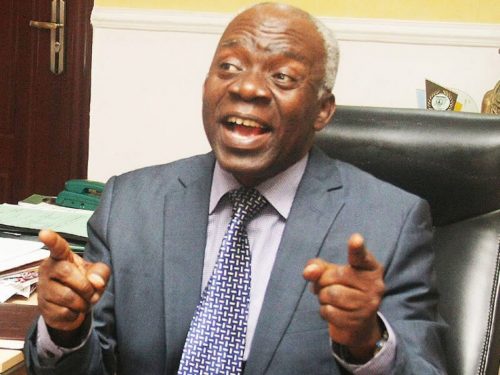
Human rights lawyer, Femi Falana, has asked President Muhammadu Buhari to reopen Nigeria’s land borders with neighbouring Benin and Niger Republics.
The borders were shut on August 20, 2019 on the orders of the Federal Government.
The Senior Advocate of Nigeria said it would be in the national interest for the government to reopen the borders.
Rather than continue to close the land borders, Falana advised the Federal Government to “urgently dialogue with Nigeria’s neighbouring countries to jointly fight the menace of smuggling, which necessitated the border closure by Nigeria”.
The lawyer gave the advice in a statement on Thursday while delivering a paper on “Rule of Law, Good Governance and Economic Development” at the annual conference of the ECOWAS Court of Justice in Accra, Ghana.
He urged the Federal Government to reject the endorsement of its border closure policy by the International Monetary Fund (IMF).
He described IMF’s endorsement of the border closure policy as “a deliberate design to weaken ECOWAS regional integration agenda”.
“Border closure is inconsistent with the letter and spirit of ECOWAS Protocol on Free Movement of Persons, Residence and Establishment and the African Continental Free Trade Agreement. The endorsement of the IMF is a deliberate design to weaken the ECOWAS regional integration agenda.
“The borders should be reopened without any further delay as it cannot be sustained for too long without serious repercussions for the Nigerian economy.
“The neighbouring countries may retaliate by imposing a ban on goods being exported from Nigeria by air. They may also close down Nigerian banks and other businesses operating in other member states of the ECOWAS.
“Instead of resorting to the unilateral closure of borders the Federal Government should drag the Republics of Benin and Niger to the Court of Justice of the ECOWAS for breaching the ECOWAS Protocol by allegedly encouraging the smuggling of petrol, rice and other products. In the alternative, smuggling should be addressed like terrorism which is being jointly combated by Nigeria and her neighbours,” he said.
Falana argued that border closure was tantamount to imposing undue punishment on law-abiding corporate bodies and community citizens “because of the criminal activities of a few trans-border smugglers”.
“The Federal Government should expose the smugglers by arresting and prosecuting them. The smugglers in Nigeria and the neighbouring countries are well-known by the security agencies. Without official connivance, the crime of smuggling cannot thrive in the region,” he said.
He also advised the Federal Government to deploy technology in border monitoring as a way of checking and tracking smugglers.
He said, “Apart from monitoring the borders with technology, the Federal Government should take advantage of the ECOWAS Protocol Relating to the re-exportation within ECOWAS of goods imported from third countries. Under the Protocol, Benin, Togo and Ghana are only entitled to charge administrative fees in respect of goods whose destination is Nigeria.”